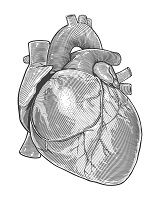Article
Research Finds Heart Failure Timetable
Author(s):
It's no secret that behavior can alter a person's likelihood of developing heart failure. In a new set of metrics, Faraz Ahmad, MD and colleagues at Northwestern University offer physicians a tool to show how many healthy heart-failure free years patients can gain by avoiding risky behaviors.

It’s no secret that behavior can alter a person’s likelihood of developing heart failure. In a new set of metrics, Faraz Ahmad, MD and colleagues at Northwestern University in Chicago, IL offer physicians a tool to show just how many healthy heart-failure free years patients can gain by avoiding risky behaviors.
In a study due to be presented March 14 at the American College of Cardiology’s upcoming meeting in San Diego, CA, Ahmad reported on an analysis of pooled data from 4 large studies including 18,280 people done over the past 40 years.
He found that people who avoided becoming obese, having hypertension or being diabetic by age 45 but later developed heart failure did not have that condition until they were 80 years old (for men, 82 years old for women).
In sharp contrast, people who were obese, diabetic and hypertensive at age 45 developed heart failure in their late 60s or early 70s.
Ahmad said the pattern was consistent across the data.
The metrics show that staying healthy until age 45 gives people a right to expect they will live an additional 11 to 13 years without heart disease compared to unhealthy peers.
“The message from the study is that you really want to prevent or delay the onset of these risk factors for as long as possible,” Ahmad said.
The value of having this set of metrics, he said, is that it gives physicians a better tool to persuade patients to take better care of their health.
“In the clinic, we often give patients metrics of risk that are relative and abstract,” Ahmad said, “It’s a much more powerful message when you’re talking to patients in their 30s or 40s, to say they will be able to live 11 to 13 years longer without heart failure if they can avoid developing these 3 risk factors now.”
Ahmad is a cardiology fellow at the university.




